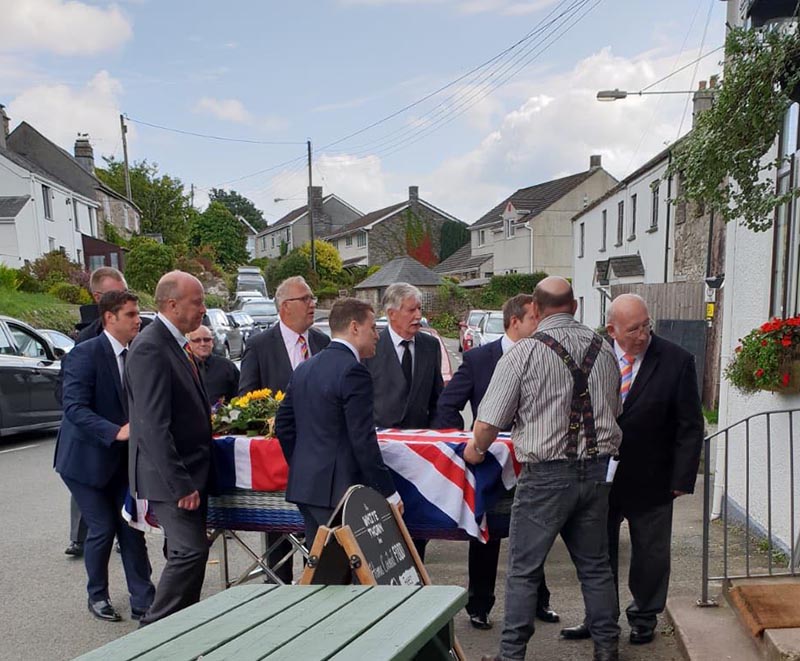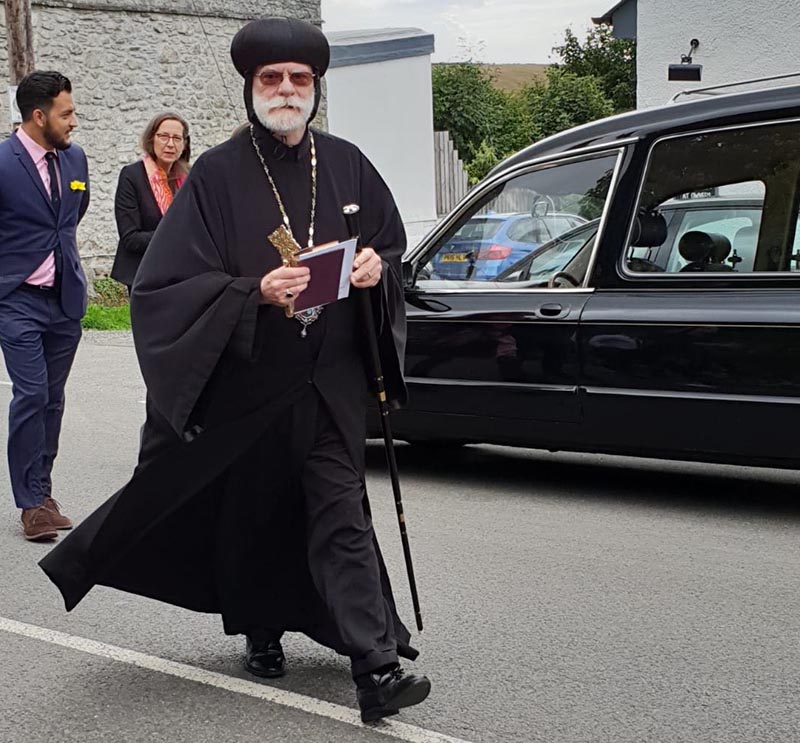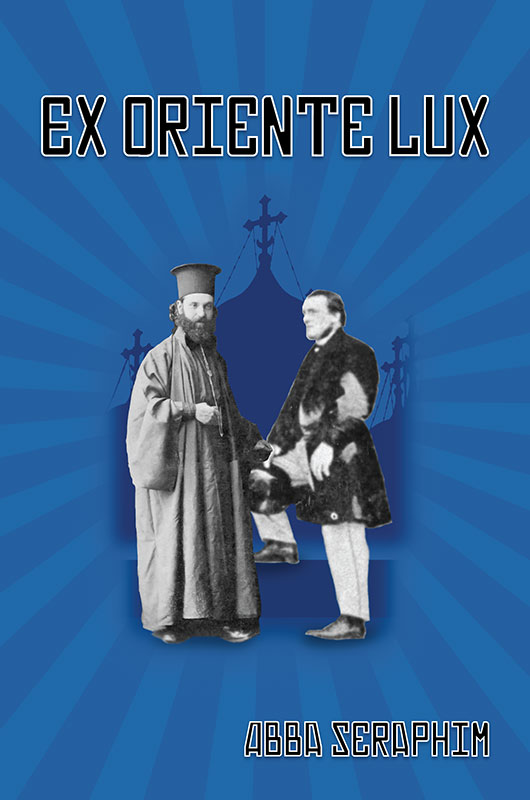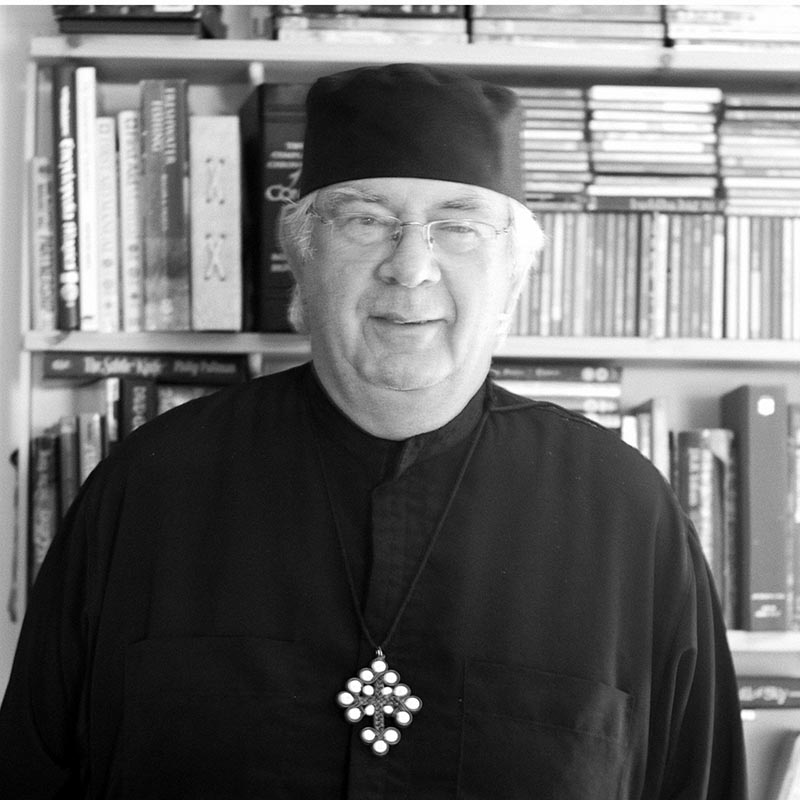Metropolitan Bishoy: Memory Eternal !
It was with much sadness that the British Orthodox Church heard of the sudden death from a heart attack on Tuesday, 2 October of His Eminence Metropolitan Bishoy of Damiette, aged only 76 years.
He served as General Secretary of the Coptic Holy Synod from 1985-2012, until the death of the late Pope Shenouda III. When the British Orthodox Church entered into union with the Patriarchate of Alexandria in 1994, Metropolitan Bishoy played a leading rôle in drafting the Protocol of Union and proved himself, over the following years, to be very supportive of Abba Seraphim and his ministry. Like Abba Seraphim, Metropolitan Bishoy, lost his father at the age of four and was brought up by his widowed mother and also, both were consecrated to the episcopate in their thirtieth year. As scholars and theologians with teaching experience they also shared a love of writing and lecturing to promote the Orthodox Faith. Abba Seraphim recalls with delight meeting Metropolitan Bishoy’s mother and aunt and also the occasion when he and his own mother welcomed Metropolitan Bishoy to the Church Secretariat and Library at Charlton.
Although by training a Mechanical Engineer, who taught in the Faculty of Engineering at the University of Alexandria, he was also active in the Sunday School movement, where he also taught in the districts of Bacchus and Sporting in Alexandria. In early 1969 he entered the Syrian Monastery (Deir Al-Sourian) – the same monastery to which Abba Seraphim was later admitted – and was professed as a monk, under the name of Father Toma El-Suriani, before being ordained to the priesthood in 1970. Two years later, on 24 September 1972, whilst he was only in his thirtieth year, Pope Shenouda consecrated him to the episcopate to serve as Bishop of Damiette, the region where his family had lived for many generations and who had produced the martyr, the deacon Saint Sidhom Bishay (died 1844), whose relics now rest in the Cathedral at Damiette. When President Sadat imprisoned leading Coptic clergy who were loyal to Pope Shenouda, Bishop Bishoy also served a prison term of several months in 1981-82 before being confined to a monastery. In 1985 he was permitted to resume his duties and returned to Damiette.
Metropolitan Bishoy was a leading Coptic scholar and theologian and in recognition of the important rôle he played in inter-church dialogue, especially that between the two families of Orthodoxy, Pope Shenouda elevated him to the rank of Metropolitan in 1990. His ministry was distinguished by his unwavering loyalty to the late Pope Shenouda and his fidelity to the Orthodox Faith as witnessed by the Coptic tradition. As a traditionalist he never ceased to expose teachings and behaviour which undermined Orthodoxy by his writings and through using his influence as Secretary of the Holy Synod.
Abba Seraphim has directed that memorial prayers should be offered in all British Orthodox churches for the next forty days and that there should be special prayers on the fortieth day, which happens also to coincide with Remembrance Sunday.
Abba Seraphim warns against rejecting God’s fatherhood
I find myself gravely concerned about the suggestion currently being put forward in certain quarters that we should avoid referring to God by masculine pronouns, as these suggest that God is male. The rise of radical feminism has encouraged a rejection of patriarchal images and concepts of God which they contend diminish, rather than empower women. Such an attitude, however, disregards the teaching of our Lord and Saviour Jesus Christ who instructed us to pray to God as “Our father”. To regard the Fatherhood of God solely as patriarchal imagery is a gross distortion of what our Lord reveals about God the Father, whose love and compassion for humankind is boundless.
It is a profound tragedy that some people do not accept God as He has revealed Himself to us but rather wish to recreate Him according to their own imagination and sympathies. As in all such cases they do not worship the God who created them in His image, but rather choose to create God in their image. Stereotypical images of masculinity and femininity must not be allowed to colour our understanding of the Divine. By nature God manifests all that is good and to view our relationship with Him through our perception of gender roles in society is unacceptable. Father figures may not always be loving and supportive of their children, but the fact that human frailty leads to imperfection which sometimes causes pain and suffering does not mean that fatherhood in itself is flawed. Equally those positive characteristics of love, compassion, gentleness and tenderness which we associate with maternal nature are not solely the preserve of females.
The Aramaic term ‘Abba’, translated as Father, is used by our Lord Jesus Christ, and has a closeness and intimacy, which is actually far from patriarchal. St. Paul tells us “because you are sons, God has sent the spirit of his son into our hearts, crying ‘Abba Father’ so through God you are no longer a slave but the son, and if a son then an heir.” (Galatians IV: 6-7). Although he here uses masculine imagery what he says is not intended only for men but embraces all Christians. Our Lord Jesus Christ is God’s son by nature, but through the generosity and mercy of God we too are enabled to become sons of God by adoption, whilst the imagery of God’s boundless generosity is captured by suggesting that we are to be beneficiaries of His inheritance. The same image of God’s bounty and freeing us from the bondage of sin and death is also conveyed by St. Paul when he says “For you did not receive the spirit of bondage again to fear, but you received the Spirit of adoption by whom we cry out, ‘Abba, Father’ (Romans VIII: 5).
The Scriptures are full of rich imagery and we must not overlook the fact that John the Baptist’s alludes to Christ as the bridegroom (John III: 29), which St. Paul interprets as His loving fellowship with His church, which in the book of Revelation is referred to as the Bride and New Jerusalem.
Attempts to counteract what they see as male dominance has led some to adopt feminine language and refer to God as ‘mother’. Sylvia Browne, an American psychic medium and author of “Mother God. The Feminine Principle to our Creator” (2004) draws inspiration from the female divinities of the ancient world. There is, however, a grave danger here of reverting to pagan and neo-Gnostic teachings which undermine orthodox Christian teaching.
It should be sufficient for us to follow in obedience our Saviour’s teaching as to how we should pray. God is our Father, emphasizing a uniquely intimate relationship; whilst we are His obedient and loving children. Again, the imagery of God’s fatherhood reveals to us a bond of fellowship with humanity, our brothers and sisters in creation.
“Let the Gate of Remembrance open unto him” – Abba Seraphim attends Deacon John Stuart’s funeral.

On 24 August, Abba Seraphim attended the funeral of Deacon John Stuart, which took place at St. Edward, King & Martyr, Church at Shaugh Prior, the next village, to John’s home at Wotter on Dartmoor. There were intermittent rain showers throughout the day, but it remained dry for the funeral. As Deacon John’s later ministry was largely to support his local Anglican clergy in their pastoral ministry, his family felt it was appropriate for his funeral to take place at one of the churches where he ministered. The principal officiant was The Rev. Captain Denis Robinson, CCF (Combined Cadet Force), formerly Chaplain of Gordon’s School at Woking, who shared Deacon John’s military background.
Upon arrival at Shaugh Prior, Abba Seraphim was warmly greeted by John’s widow, Amelie-Elizabeth. The ancient parish church was packed with family, friends and neighbours, which showed clearly that John was a much loved and respected member of the local community, where he was affectionately known as ‘Big John’ because of his standing 6 foot 6 inches tall.
John’s eco-friendly Willow Wicker coffin was borne into the church led by a piper, playing “Flowers of the Forest”, and the congregation sang the hymn, “Abide with Me” by Henry Francis Lyte, who wrote it in 1847 while he lay dying from tuberculosis. After the reading of Philip Larkin’s poem, “Aubade”, Professor Linda Wear of the University of Plymouth, one of Deacon John’s oldest friends, offered a number of personal recollections; followed by a spirited reading of Numbers XXII about Balaam’s ass by Father Freddy Denman, former Vicar of Sparkwell & priest-in-charge of Cornwood, who had also been present at Deacon John’s Ordination at Abba Seraphim’s hands in 2001.
After this, Father Denis Robinson preached on Deacon John’s commitment to Orthodoxy and the Christian Hope of the Resurrection and spoke on the church’s tradition of intercession for the faithful departed. During the service Abba Seraphim also privately recited “Prayers for the Mourning of Deacons” including the Absolution of the Son and the final Burial Prayer, over Deacon John’s coffin. The service concluded with the spirited singing of Blake’s “Jerusalem”, appropriate for the tradition of British Orthodoxy and the rôle of Glastonbury and the West Country in our Christian heritage. Deacon John was later laid to rest at Lee Moor Cemetery at South Hams, a village on the other side of his home at Wotter.

Commenting on the funeral service, Abba Seraphim said that he found it “profoundly moving” and expressive of the great love and respect in which Deacon John was held by all who knew him. Although the service was not a traditional Orthodox one, there was a strong witness to belief in the resurrection and trust in a merciful and steadfast Saviour. Deacon John’s unselfish and committed ministry of service to those with whom he came into contact ensured that many would continue to pray for him and that, having entered paradise he would now enjoy eternal life in the bosom of his loving Creator. Memory Eternal !
New book published on Orthodox History in Britain

We are pleased to announce that the British Orthodox Press has just published a new book on the history of Orthodoxy in Britain. “Ex Oriente Lux. The Story of Dr. Joseph J. Overbeck (1820-1905) and Father Stephen Hatherly (1827-1905), two converts to Orthodoxy with different conceptions of founding an indigenous Orthodox Church”.
This chapter in the history of nineteenth century Christendom has been sadly neglected by writers and Church historians. During the middle of the 19th century Stephen Hatherly, an English church musician and Dr. Joseph Overbeck, a Prussian Catholic scholar priest who had settled in England, both converted to Orthodoxy. Tragically, an early clash of personalities caused them to be life-long enemies. Hatherly believed the Byzantine Liturgy the very essence of Orthodoxy and told the Greek community in Manchester, “I glory in nothing more than that I stand before you as a Greek priest.” Dr. Overbeck’s scheme for a Western-rite Orthodoxy was repugnant to Hatherly and he wrote to his rival that he would not stand by and see him “blend any figment of your old popery or any old Protestantism with our Orthodox ritual.”
The author, Abba Seraphim, Metropolitan of Glastonbury, is a noted authority on British Orthodox history and has based this book on a series of articles which he first wrote for The Glastonbury Bulletin between 1978-1980, but greatly amplified by hitherto unpublished material he has since researched; notably detailed analysis of contemporary manuscript correspondence, as well as his friendship with members of the Hatherly family. The book also includes the first published photograph of Father Stephen Hatherly, with one of Dr. Overbeck in mid-life, as well as a beautiful miniature of him in his later years, the copyright of which belongs to the National Trust, who authorised its reproduction.
Although there have been numerous references to them in wider studies on Orthodox history, other than Wilhelm Kahle’s 1968 academic study (in German) on Dr. Overbeck’s scheme, this is the first full book in English specifically written on these Orthodox pioneers.
Copies of “Ex Oriente Lux” (hardbound, 231 pp + illustrations) can be obtained online from Lulu.com, price £20.
http://www.lulu.com/shop/abba-seraphim/ex-oriente-lux/hardcover/product-23764953.html
Deacon John Stuart Reposes in the Lord

After a long period of ill health, Deacon John Stuart of Dartmoor, died on 9 August, aged 71 years.
John Howard Newton Stuart was born on 5 June 1947 in the small historic market town of Howden in the East Riding of Yorkshire, close to the home of his maternal grandfather, Fred Wright, who owned Hemingbrough Hall 1938-1952. When, less than a year old, his father took the family to Southern Rhodesia (now Zimbabwe) and later establishing a printing business in Northern Rhodesia (now Zambia). John attended a boarding school in Southern Rhodesia and, on leaving school became a photographer with the Northern News, Northern Rhodesia’s daily paper. He also trained as a film cameraman and moved back to Southern Rhodesia when television broadcasting began in 1960.
Whilst he was doing his military national service, John’s father died and he returned to England with his mother, as his younger brother was at sea as a cadet. He studied his A-levels at the former Taunton Technical College, from where he went to Hull University with the intention to read Divinity & Politics, but didn’t settle to academic life there, so joined the army instead. This coincided with his mother having joined the WRVS and being posted to Hong Kong. After commissioning he was posted to the Gulf to join the 200 Hovercraft Squadron, Royal Corps of Transport (RCT). Following Britain’s decision to withdraw from the Gulf, the Hovercraft Squadron was eventually disbanded and John was re-badged as an Infantry officer. At the end of engagements, mainly in Northern Ireland and Germany, he left the army, but returned to the Gulf, where he worked on several projects for the Ruler of Dubai.
After this he returned to Britain and resumed his camera work, working for the Ministry of Defence, the BBC and other broadcasters. For a period he served as Head of Film at TSW (Television South West) and then Electronic News Gathering at TVam. He was the first national cameraman at Lockerbie in December 1988 when the Pan Am jumbo jet crashed with the death of 259 passengers on board and a further 11 casualties on the ground. After 1992 when the franchise ended, he worked as a freelance, during which period he married Amelie and their daughter, Lissi, was born.
John’s background was certainly not that of a conventional clergyman, but his Christian faith had sustained him through his life, whilst his essential decency of character, and selfless kindness began to manifest themselves more as he matured with age.
John now decided to resume his academic studies, which had been interrupted by his military career, so he started to read Theology at Exeter University, where he met Father Martin Lee, who not only had common academic interests, but also shared a military background. As part of his commitment to supporting those in need, John took up driving HGV lorries of aid to orphanages and missions in Roumania, which took him across the Carpathians in Moldova. Whilst abroad he began attending Orthodox church services, with which he felt profoundly at home. Through his friendship with Father Martin he began to learn about the mission and vision of the British Orthodox Church and was eventually received into the church and attached to Father Martin’s St. Mark & Archangel Michael Mission at Sidmouth. To support the mission he was first ordained as a Reader on 26 March 2000 and later as a Subdeacon on 23 July 2000, both at Sidmouth at the hands of Metropolitan Seraphim. He was finally ordained as a full Deacon on 10 February 2001 by Metropolitan Seraphim in the Chapel of St. Luke’s College, Exeter. The following year Amelie and Lissi wished to relocate to Berlin, so in August 2002 Deacon John bought a cottage at Wotter on the south western edge of Dartmoor, as a retreat to continue his local ministry, although he was a frequent visitor to Germany.
In 2005 Father Martin retired from active church ministry on health grounds and the Sidmouth Mission was closed. After that Deacon John continued with the pastoral ministry he had developed whilst working as a part-time medic in local hospitals, but now was only able to attend the occasional liturgies celebrated by the British Orthodox Church at Glastonbury Abbey or make the longer journey to the Bournemouth Church. In November 2009 he suffered a slight stroke, which necessitated some restrictions on his activities although in 2012 he sought permission to work closer to home, serving as an Honorary Orthodox Chaplain within the NHS Plymouth Hospitals Chaplaincy team and in supporting his local Anglican clergy on Dartmoor in their pastoral ministry to local Christians, especially the sick and elderly. Although he was no longer able to officiate under the auspices of the British Orthodox Church, he insisted that he still regarded himself as one of Abba Seraphim’s deacons and was not prepared to align himself with those who, after 2015, decided not to support its renewed independence.
His health, however, continued to steadily deteriorate and he spent much time convalescing in Berlin, where he was finally diagnosed with cancer of the stomach and leukemia. At the end of July, upon his return from Germany, where he had spent a long period receiving medical care, he telephoned Abba Seraphim from a hospital in Plymouth to advise him of his terminal condition and to seek his prayers.
Deacon John’s genuine pastoral spirit and commitment to those in need, was a constant strength to all those to whom he ministered. His practical nature and personal warmth, combined with an impressive intellect, provided sound and solid support to all who sought it. Sadly, circumstances and his own health, limited the scope of his ministry, but among those few to whom he so freely offered his service, the benefits were significant and he truly manifested the earthly diaconal ministry of our Lord and Saviour, who went about doing good, for God was with him (Acts X: 38). Memory Eternal !
